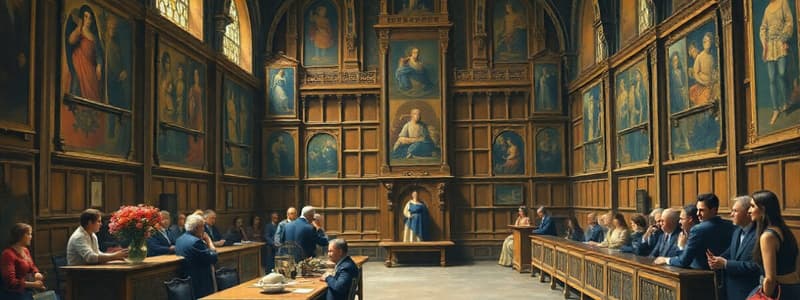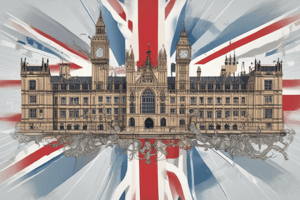Podcast
Questions and Answers
What are the two chambers of Parliament called?
What are the two chambers of Parliament called?
- House of Commons and House of Senators
- House of Representatives and House of Lords
- Senate and House of Commons
- House of Commons and House of Lords (correct)
Members of the House of Lords are elected.
Members of the House of Lords are elected.
False (B)
Who is invited by the Monarch to form a government after an election?
Who is invited by the Monarch to form a government after an election?
The leader of the majority party
The leader of the party that forms the government is known as the __________.
The leader of the party that forms the government is known as the __________.
Match the following government roles with their descriptions:
Match the following government roles with their descriptions:
Which of the following methods is NOT a way for citizens to hold parliament to account?
Which of the following methods is NOT a way for citizens to hold parliament to account?
The Executive is another term used to describe the Parliament.
The Executive is another term used to describe the Parliament.
What system ensures that each branch of government can check the others?
What system ensures that each branch of government can check the others?
The __________ is responsible for making laws in the UK.
The __________ is responsible for making laws in the UK.
During Prime Ministers Questions, which of the following occurs?
During Prime Ministers Questions, which of the following occurs?
Which group is NOT excluded from standing as political candidates in an election?
Which group is NOT excluded from standing as political candidates in an election?
The UK has a codified constitution.
The UK has a codified constitution.
What is the purpose of the Magna Carta?
What is the purpose of the Magna Carta?
The procedure through which a court can review an action of a public body is called _______.
The procedure through which a court can review an action of a public body is called _______.
Match the following types of government with their key characteristics:
Match the following types of government with their key characteristics:
Which of the following is a principle of the British constitution?
Which of the following is a principle of the British constitution?
Conventions in the UK constitution are written laws that must be enforced.
Conventions in the UK constitution are written laws that must be enforced.
What role does common law play in the UK legal system?
What role does common law play in the UK legal system?
The document that outlines the current government’s agenda at the State Opening of Parliament is called the _______.
The document that outlines the current government’s agenda at the State Opening of Parliament is called the _______.
Which document was written in 1689 and is a key part of the UK constitution?
Which document was written in 1689 and is a key part of the UK constitution?
What event occurs after the Queen summons Black Rod?
What event occurs after the Queen summons Black Rod?
The Queen has the power to dissolve Parliament under the current laws.
The Queen has the power to dissolve Parliament under the current laws.
What is the date set for the next general election according to the Fixed-term Parliaments Act 2011?
What is the date set for the next general election according to the Fixed-term Parliaments Act 2011?
The Queen's speech outlines the Government's ______ plans.
The Queen's speech outlines the Government's ______ plans.
Match the following elements to their descriptions:
Match the following elements to their descriptions:
What is required for Parliament to call an early general election?
What is required for Parliament to call an early general election?
The ceremony of the State Opening of Parliament dates back to the 19th century.
The ceremony of the State Opening of Parliament dates back to the 19th century.
What must happen 25 days before the election date?
What must happen 25 days before the election date?
The opening of Parliament session allows ______ to debate the contents of the speech.
The opening of Parliament session allows ______ to debate the contents of the speech.
Which government position would it be unusual for someone to call for an early election through a motion of no-confidence?
Which government position would it be unusual for someone to call for an early election through a motion of no-confidence?
Study Notes
Parliament
- The UK Parliament is bi-cameral, consisting of the House of Commons (elected MPs) and the House of Lords (unelected peers).
- Parliament is responsible for making laws and is sometimes referred to as the ‘legislature’.
- Parliament represents the people by debating proposed legislation.
- Parliament scrutinizes the work of the government through select committees and questioning ministers.
Government
- After an election, the leader of the majority party is invited to form a government by the Monarch.
- The leader of the majority party becomes Prime Minister and appoints ministers to run government departments.
- Ministers and civil servants in each department are responsible for drafting bills.
- Senior ministers form the cabinet.
- Junior ministers support departmental work.
- The Prime Minister and Cabinet are collectively known as the Executive.
Checks and Balances
- The UK system of checks and balances is based on the separation of powers.
- Each branch of government (Judiciary, Legislature, and Executive) has power to check the actions of the other branches.
Holding the Government to Account
- The public scrutinizes the government through the media, select committees, debates in the Commons, Prime Ministers Questions, and by voting in elections.
- Citizens can hold Parliament to account by lobbying representatives, joining pressure groups, campaigning in the media, protesting, and starting online petitions.
Excluded from Standing in Elections
- The Electoral Commission sets out rules for standing in elections.
- The following groups are excluded: members of the royal family, members of the armed forces, members of the House of Lords, members of the police force, civil servants, sitting judges, and those subject to bankruptcy or debt relief restrictions.
Judicial Reviews
- A Judicial Review is a legal procedure where a court reviews an action of a public body (government) and can challenge it.
Constitution
- The UK has an uncodified (unwritten) constitution.
- The constitution sets out procedures and the powers of different institutions, including the Executive, Judiciary, and Legislature.
- It protects citizens’ rights and freedoms.
- The Magna Carta (1215) is a key document in the British constitution, limiting the power of the monarchy and guaranteeing citizen rights.
Important Principles of the British Constitution
- Parliamentary sovereignty: Parliament is the supreme authority in the UK.
- The rule of law: No one is above the law.
- Common law: Based on precedent, also known as "judge-made" law.
Key Laws of the UK Constitution
- Magna Carta (1215)
- Act of Union (1707)
- Bill of Rights (1689)
- European Communities Act (1972)
- Human Rights Act (1998)
Conventions
- Unwritten customs and rules that are a key part of the UK’s constitution.
- They have developed over time and are not legally enforceable.
- Example: The King or Queen must agree to any new law (Royal Assent).
Political Spectrum
- The terms "right-wing" and "left-wing" originated in the French Revolution.
- Conservatives (right-wing) sat on the right of the speaker, while radicals (left-wing) sat on the left.
Types of Governments
- Communism: Power to the people, classless system, equality, and sharing (e.g., Cuba).
- Socialism: Shared profits, trade union protections for workers, and power to the people.
- Capitalism: Big business and the economy are powerful, low taxes, and reward for hard work (e.g., American Dream).
- Liberalism: Democracy, individual rights, and government working for the people.
- Conservatism: Government keeps businesses in check, strong and stable government run by smart people.
- Fascism: Nationalistic and autocratic leadership, country over individual, suppression of opposition.
- Anarchism: No rules or authority, freedom without laws.
State Opening of Parliament
- Marks the official start of the parliamentary year.
- Queen's Speech outlines the government's agenda for the coming session.
- The only occasion when the three parts of Parliament (Sovereign, House of Lords, House of Commons) meet.
- Happens on the first day of a new parliamentary session or shortly after a general election.
Procedures of State Opening
- Members of both Houses take their seats.
- The Serjeant at Arms, Speaker, and Chaplain enter the Commons, and a prayer is read.
- The Queen enters the Lords Chamber and takes her seat.
- Black Rod summons MPs to the Lords Chamber.
- The Queen delivers the speech outlining the government's legislative plans.
- The Queen exits, and both Houses return to work, debating the speech.
Calling an Early General Election
- The Fixed-term Parliaments Act 2011 sets the date of the next election.
- Parliament can call for an early election under two conditions:
- A motion of no-confidence in the current government.
- A vote by two-thirds of MPs.
Traditions of State Opening
- Traditions date back to the 16th century.
- The current ceremony dates from the opening of the rebuilt Palace of Westminster in 1852.
Studying That Suits You
Use AI to generate personalized quizzes and flashcards to suit your learning preferences.
Description
Explore the roles and responsibilities of the UK Parliament and Government in this quiz. Understand the structure of the bi-cameral parliament, the function of the Prime Minister, and how checks and balances are implemented in the political system. Test your knowledge of legislative procedures and government organization.




